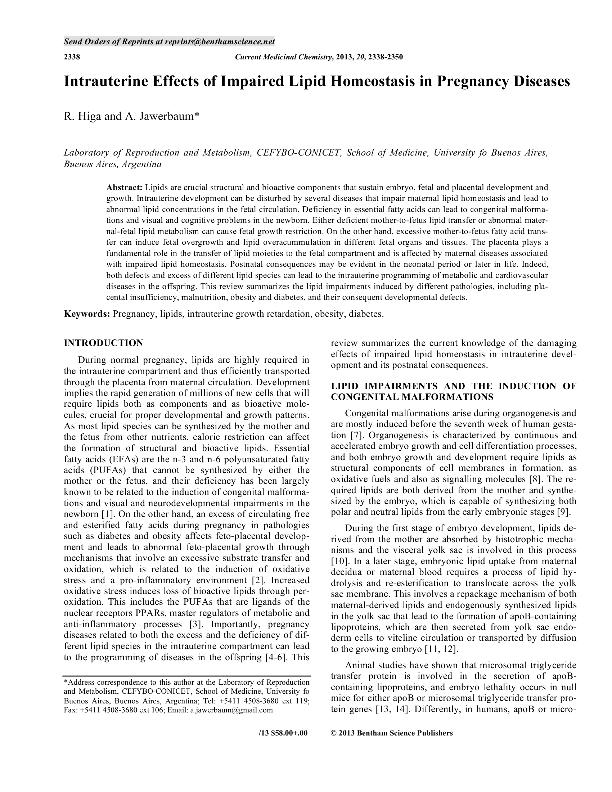Artículo
Intrauterine effects of impaired lipid homeostasis in pregnancy diseases
Fecha de publicación:
01/2013
Editorial:
Bentham Science Publishers
Revista:
Current Medicinal Chemistry
ISSN:
0929-8673
e-ISSN:
1875-533X
Idioma:
Inglés
Tipo de recurso:
Artículo publicado
Clasificación temática:
Resumen
Lipids are crucial structural and bioactive components that sustain embryo, fetal and placental development and growth. Intrauterine development can be disturbed by several diseases that impair maternal lipid homeostasis and lead to abnormal lipid concentrations in the fetal circulation. Deficiency in essential fatty acids can lead to congenital malformations and visual and cognitive problems in the newborn. Either deficient mother-to-fetus lipid transfer or abnormal maternal- fetal lipid metabolism can cause fetal growth restriction. On the other hand, excessive mother-to-fetus fatty acid transfer can induce fetal overgrowth and lipid overacummulation in different fetal organs and tissues. The placenta plays a fundamental role in the transfer of lipid moieties to the fetal compartment and is affected by maternal diseases associated with impaired lipid homeostasis. Postnatal consequences may be evident in the neonatal period or later in life. Indeed, both defects and excess of different lipid species can lead to the intrauterine programming of metabolic and cardiovascular diseases in the offspring. This review summarizes the lipid impairments induced by different pathologies, including placental insufficiency, malnutrition, obesity and diabetes, and their consequent developmental defects.
Palabras clave:
Pregnancy
,
Lipids
,
Intrauterine Growth Retardation
,
Obesity
,
Diabetes
Archivos asociados
Licencia
Identificadores
Colecciones
Articulos(CEFYBO)
Articulos de CENTRO DE ESTUDIOS FARMACOLOGICOS Y BOTANICOS
Articulos de CENTRO DE ESTUDIOS FARMACOLOGICOS Y BOTANICOS
Citación
Higa, Romina Daniela; Jawerbaum, Alicia Sandra; Intrauterine effects of impaired lipid homeostasis in pregnancy diseases; Bentham Science Publishers; Current Medicinal Chemistry; 20; 18; 1-2013; 2338-2350
Compartir
Altmétricas




